Quality Omega-3 Acids That Are Crucial for Your Health

Fish oil is the best possible source of omega-3 fatty acids. Which fish oil is the best? The exact answer depends on various factors such as your age, health condition, preferred supplement type, and last but not least your budget. Here is a detailed review of the best supplements available on the market.
Which Brand of Fish Oil Is the Best
The simplest way of choosing that saves a lot of time and effort is by brand. Generally speaking, there are three kinds of manufacturers:
- Premium brands: highest possible quality at high prices;
- Best-bargain brands: good quality, affordable prices, best quality/price ratio;
- Low-cost brands: steer away from them.
It is important that a manufacturer of quality fish oil have its product tested and certified by an independent organization, like the United States Pharmacopeia (USP) or the Therapeutic Goods Association (TGA).
Established in 1982, Carlson Labs is one of the best premium brands on the market. You will always get your money’s worth buying from it. The only drawback of this brand is that it does not economize on quality and as a result does not come cheap.
Omega-3 supplements by Carlson Labs are usually:
- made from wild-caught fish
- non-GMO tested
- lack artificial preservatives
- manufactured in a facility that is regulated by FDA
- certified by IFOS.
NOW Foods offers one of the best quality/price ratios on the market; the affordability of goods under this brand generally does not compromise their quality. Omega-3 supplements by NOW Foods are usually:
- non-GMO
- Good Manufacturing Practices independently certified
- tested to be free of harmful contaminators like dioxins, PCB’s, mercury and other heavy metals.
Best Fish Oil on the Market
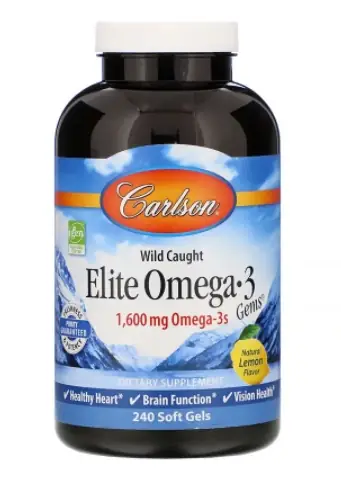
If you are looking for premium quality and the price doesn’t really matter, this supplement is exactly what you need. Packed with omega-3 fatty acids and vitamin E, very low on cholesterol and total fat, this supplement is all about enjoying good health and staying slim.
- softgels
- DHA: 600 mg and EPA: 800 mg per serving
- naturally lemon flavored
- sourced from deep, cold-water fish
Best Affordable Liquid Fish Oil Supplement
Omega-3 Lemon Flavored by NOW Foods
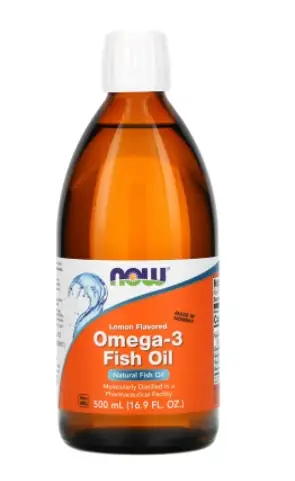
You don’t have to pay a king’s ransom for a supplement to get all the fatty acids you need. This liquid product is lemon-flavored so you won’t have trouble swallowing it, and every teaspoon contains a healthy dose of DHA and EPA. What’s more, it is manufactured from anchovies, sardines, and mackerel — smaller fish that do not contain significant quantities of mercury and other contaminants.
- DHA: 460 mg and EPA: 740 mg
- Other omega-3 fatty acids: 200 mg
Best Tasting Fish Oil Supplement
Barlean’s Orange-Flavored Softgels
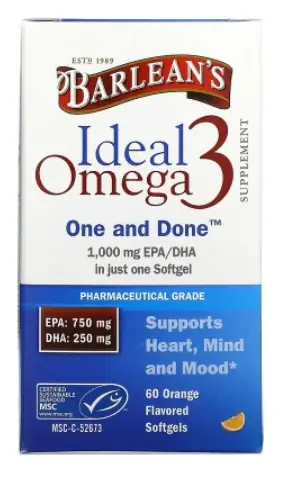
Manufacturers usually use the lemon flavor to mask the fishy taste of the oil, and even if it is adequately doing its job, you still cannot say that your supplement is delicious. This supplement makes a big step forward and uses softgels that taste like juicy oranges. What’s more, while most manufacturers make their customers swallow two softgels, Barlean manages to pack a 1 000 mg of omega-3 fatty acids into a single one. Thus, if you can’t stand the taste of fish oil, this supplement is exactly what you need.
- DHA: 250 mg and EPA: 750 mg
- IFOS tested
- Low on fat
Best Fish Oil Supplement for Kids
Kid’s Cod Liver Oil by Carlson Labs
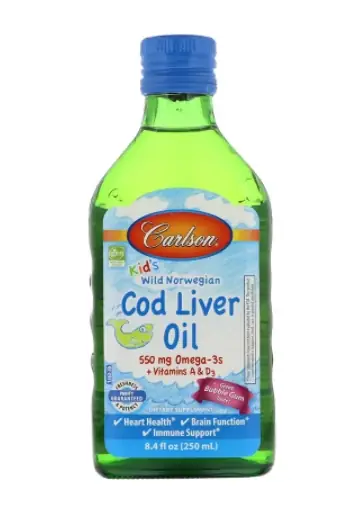
Choosing the right supplement for your kids is not an easy task: the supplement needs to be truly beneficial for health and taste good at the same time. When it comes to omega-3 supplements this task gets especially difficult as you need to mask a very pronounced and not at all pleasant taste of fish.
Carlson Labs manages to make its supplement taste like bubble gum while keeping it free from artificial preservatives and using nothing but natural flavors. This product contains lots of DHA and EPA as well as a healthy dose of vitamins A, E, and D: your kids will love it!
- DHA: 250 mg and EPA: 200 mg
- IFOS tested
- non-GMO
- great bubble gum taste
Best Liquid Fish Oil
The Very Finest Fish Oil by Carlson Labs
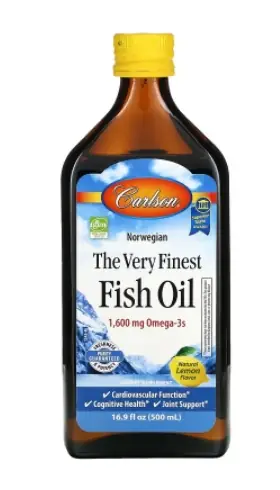
Free from numerous contaminants, heavy metals, and PCBs, this excellent supplement is packed with DHA, EPA, and vitamin E.
- DHA: 500 mg and EPA: 800 mg
- Made from sardine, anchovy, and mackerel
- regularly tested by independent FDA registered laboratories
- IFOS tested
Best Gummy Fish Oil Supplement
Omega-3 Gummies by Natural Dynamix
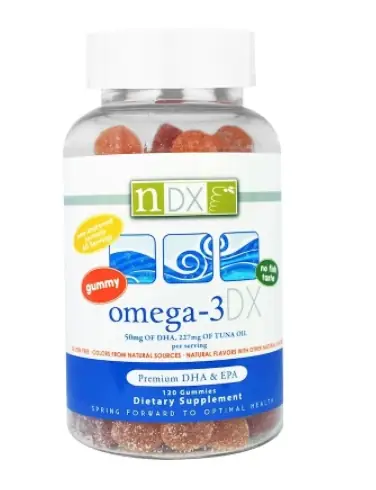
Children and grown-ups who cannot stand even the slightest hint of fishy taste can still enjoy these healthy supplements in the form of gummies. This product is naturally flavored and colored and has a very pleasant taste: sweets can be good for your health after all.
Still, there are some drawbacks. First, the content of omega-3 fatty acids in gummies is much lower than in most other supplement types: you can buy a lot more DHA and EPA at the same price if you choose regular softgels and liquids. Second, these gummies are heat sensitive and online stores like iHerb do not ship them in summer.
- DHA: 50 mg and EPA: 10 mg
- no fishy aftertaste or reflux
- made from tuna
- gummies need to be chewed before swallowing
Best Affordable Softgel Fish Oil Supplement
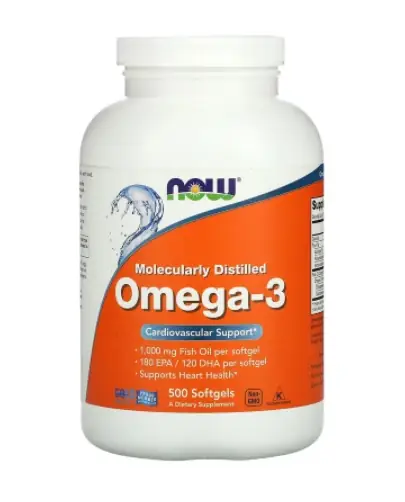
Every cent you spend on this product is returned to you in the form of healthy DHA and EPA molecules. These softgels are packed with beneficial fatty acids and do not cost much. What’s more, their fat content is low, so you won’t have to readjust your diet. On the downside, as no additional flavors are used, these softgels can have some fishy aftertaste: they should not be taken on an empty stomach.
All things considered, the best choice is for a limited budget.
- DHA: 240 mg and EPA: 360 mg
- manufactured from anchovies, sardines, and tuna
- free of PCBs, dioxins, and heavy metals
Which Fish Oil Is the Best for Lowering High Cholesterol Levels
Red Omega: Red Yeast Rice with CoQ10 & Omega-3 by NOW Foods
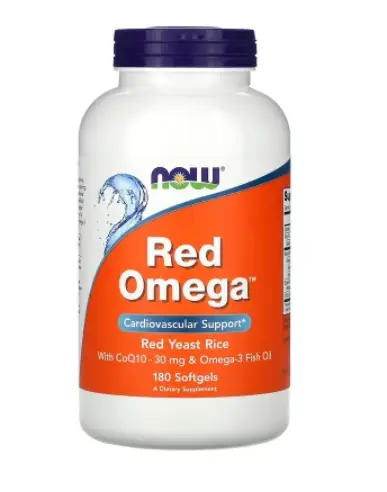
Contrary to the popular belief, whether omega-3 fatty acids are truly efficient in reducing risks of cardiovascular disease and lowering the levels of bad cholesterol still remains an open question. Thus, when buying supplements for your heart health, decide on the ones that combine fish oil with other compounds that are proven to be effective and reliable. Red Omega by NOW Foods is a good example of such a supplement: it uses clinically tested red yeast rice and highly promising coenzyme Q10 as well as fish oil. The combined action of these three components is bound to help your cardiovascular system stay healthy.
- DHA: 240 mg and EPA: 360 mg
- 600 mg of organic Red Yeast Rice
- 60 mg of coenzyme Q10
- no PCBs, dioxins, and heavy metals
Best Cod Liver Oil
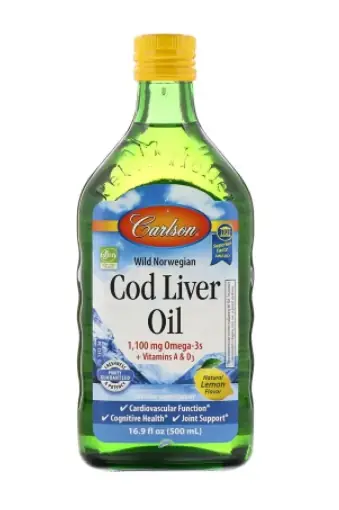
Not only does cod liver oil contain a lot of omega-3 fatty acids, but it is also an excellent source of such fat-soluble vitamins as A, D, and E. This supplement is packed with these vitamins in their most bioavailable form: it will be especially beneficial for people who live in the north and don’t have enough sunlight for vitamin D3 synthesis in winter. Still, if you want to maximize your DHA and EPA intake, you might want to use The Very Finest Fish Oil by Carlson Labs mentioned above: although it contains no vitamins, it offers twice as much EPA as the version from cod liver.
- DHA: 500 mg and EPA: 400 mg
- vitamin A: 28% of recommended daily value (RDV)
- vitamin D3: 50% of RDV
- vitamin E: 45% of RDV
- natural lemon flavor and no artificial preservatives
- independently tested by FDA registered laboratories.
Fish Oil & Omega 3 Benefits for Health
Fish oil contains two important omega-3 fatty acids:
- DHA (docosahexaenoic acid) is crucial for the normal functioning of the nervous system. Brain, nervous system, skin, and retina use DHA as their irreplaceable component. What’s more, the body uses DHA for the metabolism of such compounds as choline, glycine, and taurine. DHA deficiency was tied to decline in cognitive function.
- EPA (icosapentaenoic acid) is a precursor to DHA. EPA is known to reduce inflammation and might have mild antidepressant effects.
Such plant sources as flaxseed, hempseed, soybeans, as well as rice bran, and walnut oils are used for manufacturing dietary supplements that contain ALA (α-Linolenic acid). The body can use ALA to produce EPA, and then use EPA to produce DHA.
Unfortunately, the efficiency of transforming ALA into EPA is considerably lower than the absorption of EPA from food sources. Such health conditions as diabetes and allergies may additionally hamper such a conversion. Thus, fish oil remains the best possible source of EPA and DHA.
Fish Oil for Pregnancy
It is recommended that those who want to become pregnant increase their omega-3 fatty acids intake. Dietary recommendations for pregnant and lactating women are 300 mg of DHA per day. It is believed that children whose mothers used omega-3 supplements during lactation show better psychomotor development. What’s more, taking omega-3 during pregnancy is tied to lower infant’s susceptibility to allergens and such conditions as asthma, eczema, and hay fever.
Which Fish Oil Is the Best for Lowering Triglycerides
Clinical studies show that to achieve a significant lowering of triglycerides a person needs to take large doses (2 000 mg per day or more) of omega-3 fatty acids. Thus, it is recommended that you use either one of the two already mentioned supplements:
- The Very Finest Fish Oil by Carlson Labs (1300 mg of DHA and EPA)
- Elite Omega 3 by Carlson Labs (1400 mg of DHA and EPA)
and take them in doses from 1.5 to 2 times higher than recommended by the manufacturer. It is extremely important that you consult an experienced health practitioner first!
Size Matters
Contrary to popular belief, fish used for manufacturing oil supplements do not actually produce omega-3 acids. They either eat algae that synthesize fatty acids or prey on smaller organisms that have already accumulated omega-3 in their bodies. Thus, the larger the size of the fish, the more omega-3 acids it can store in its body.
Unfortunately, large-size organisms also accumulate various toxic substances like heavy metals and PCBs. Thus, it is important that manufacturers of dietary supplements use varieties that are small enough and do not contain significant quantities of contaminants (like, for example, herring, cod, and anchovies).
Fish Oil: Benefits for Hair
There is a popular misconception that applying liquid omega-3 supplements on the scalp supports hair growth and luster. Unfortunately, this claim was never clinically tested and is very likely untrue.
There were some small studies that demonstrated that dietary supplements with omega-3 fatty acids might help to get an increase in hair, but they are far from being conclusive.
Fish Oil Side Effects
Although this product is usually well-tolerated some potential adverse effects should be kept in mind:
- some people might feel nauseous after taking the supplement. One of the ways of avoiding this is to use softgels instead of liquids and take them at mealtime;
- very large intake of omega-3 acids might lead to slower blood clotting. The Inuit people who take as much as 5.7 grams of EPA on average were found to suffer from this condition. Omega-3 supplements should not be taken with warfarin and other anticoagulants;
- it is possible that in some people daily intake of omega-3 fatty acids in quantities more than 1 gram (1 000 mg) might elevate risk of atrial fibrillation;
- supplements from cod liver contain large quantities of active forms of fat-soluble vitamins A and D3. If overdosed (especially on vitamin A) they can get highly toxic;
- it is believed that intake of large quantities of DHA (but not EPA) might elevate the level of low-density lipoprotein, an important factor in atherosclerosis development.
FDA recommends that a combined daily intake of DHA + EPA does not exceed 3 grams (3 000 mg).
Now you know which fish oil is the best for your health and everyday use. Take care!